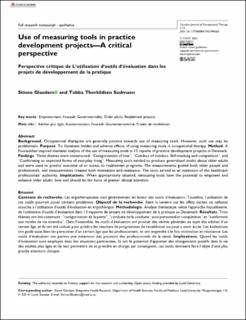Use of measuring tools in practice development projects—A critical perspective
Journal article, Peer reviewed
Published version
Permanent lenke
https://hdl.handle.net/11250/2733682Utgivelsesdato
2021Metadata
Vis full innførselSamlinger
- Import fra CRIStin [3604]
- Institutt for helse og funksjon [584]
Originalversjon
Glasdam, S., & Sudmann, T. T. (2021). Use of measuring tools in practice development projects—A critical perspective. Canadian Journal of Occupational Therapy. 10.1177/0008417421994365Sammendrag
Background.
Occupational therapists are generally positive towards use of measuring tools. However, such use may be problematic.
Purpose.
To illuminate hidden and adverse effects of using measuring tools in occupational therapy.
Method.
A Foucauldian inspired thematic analysis of the use of measuring tools in 13 reports of practice development projects in Denmark.
Findings.
Three themes were constructed: “Categorisation of loss”, “Conduct of conduct: Self-tracking and competition”, and “Conforming to expected forms of everyday living”. Measuring tools tended to produce generalised truths about older adults and were used to predict outcome of or access to reablement programs. The measurements guided both older people and professionals, and measurements created both motivation and resistance. The tools served as an extension of the healthcare professionals’ authority.
Implications.
When appropriately situated, measuring tools have the potential to empower and enhance older adults’ lives and should be the focus of greater clinical attention.

